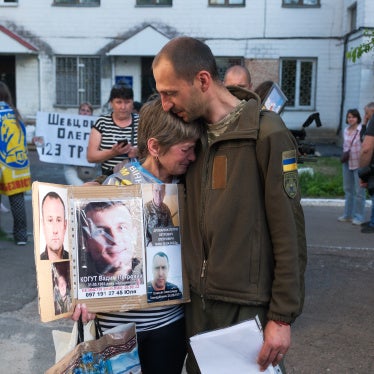(Moscow) - Russian authorities should stop blocking peaceful demonstrations, Human Rights Watch said today.
The police detained at least 100 peaceful protesters in Moscow on January 31, 2010, during a rally supporting freedom of assembly. Those arrested include three leading human rights defenders: Oleg Orlov, chairman of Memorial Human Rights Center; Lev Ponomarev, director of the Movement for Human Rights; and Yuri Dzhibladze, president of the Center for Development of Democracy and Human Rights.
"Russian law clearly allows for freedom of assembly," said Tanya Lokshina, deputy director for Human Rights Watch in Moscow. "But these arrests of human rights leaders and peaceful protesters are a prime example of how blatantly the authorities violate this right."
Several hundred people participated in the rally, the latest in a series of such events held on the last day of months with 31 days, to call attention to article 31 of the Russian constitution, which provides for freedom of assembly. The January 31 rally was the first officially supported by Russia's key human rights groups, including the Moscow Helsinki Group, Memorial, and the Movement for Human Rights. The groups' decision reflected their growing concern with unjustified restrictions on freedom of assembly, Lokshina said.
When an observer from Human Rights Watch arrived at 5.50 p.m. at Triumfalnaya Square, the site planned for the 6 p.m. demonstration, it was already surrounded by police, who had used metal gates to prevent the participants from entering. Human Rights Watch counted more than two dozen police buses and trucks, and estimated that the hundreds of police present outnumbered the protesters. Police officials repeatedly announced on a loudspeaker that the event was illegal and urged the participants to leave.
Protesters gathered on the sidelines of the square and chanted, "Freedom!" "Respect the Russian Constitution!" and "Russia without Putin!" Some carried posters with similar slogans.
At around 6.10 p.m., the police closed ranks on the participants. The police began to detain protesters almost immediately, including both those chanting slogans and carrying posters and apparently random members of the crowd. Those detained were dragged into police buses and taken to at least five police stations in central Moscow, where they were processed and administrative court hearings were scheduled.
One of the detainees held at Khamovniki police station told Human Rights Watch upon release that he had not taken part in the rally and was simply returning home from work when he was suddenly "jumped" by police and dragged into a bus.
According to press reports and preliminary lists of detainees put together by the organizers of the rally, over 100 people were detained.
Between 6:30 and 7 p.m., the Human Rights Watch observer was detained on three occasions by the police and put on buses with the other detainees. The observer was released each time only after presenting a valid press card to police superiors. A correspondent from a mainstream Russian newspaper, Sobesednik, reported to Human Rights Watch that their intern photographer was also detained and put on a bus.
Russian law requires groups to notify city authorities when they intend to hold a public gathering. The organizers of the January 31 demonstration had informed the relevant authorities of their intention to hold the event at 6 p.m. in Triumfalnaya Square, in downtown Moscow. The authorities told them they would not be allowed to hold the demonstration because a "winter festival" was planned for the same time and place. Human Rights Watch saw no evidence of such a festival that evening at the square.
"Holding public assemblies is supposed to be based on a system of notification," Lokshina said. "But in reality, the authorities make it a licensing system, using various technical pretexts to prevent protests and then dispersing and detaining the participants."
Ludmila Alekseeva, chairperson of the Moscow Helsinki Group and one of Russia's renowned human rights leaders, called the incident "a terrible disgrace for the Moscow and federal authorities." At last month's rally in support of freedom of assembly, police detained Alekseeva, 82, nearly causing her to fall over while taking her into custody. Alekseeva had attended the protest in her personal capacity.
Dzhibladze told Human Rights Watch that in response to his questions, "a police colonel in charge told me I was being detained for ‘resisting police officers,' which was not true at all. My detention was completely arbitrary. There were around 30 people on the same bus with me, and they also stressed that they had not done anything to provoke the police."
Human Rights Watch is concerned about the increasingly hostile environment for civic activists in Russia.
"The election of President (Dmitry) Medvedev occasioned some optimism for a new environment of respect and support for pluralism and civil society," Lokshina said. "But we have not seen any significant changes so far. President Medvedev should back his rhetoric with concrete actions, including ensuring peaceful freedom of assembly."
Russia is a party to the European Convention on Human Rights and the International Covenant on Civil and Political Rights, both of which guarantee freedom of assembly (under articles 11 and 21 respectively). The right to freedom of assembly is recognized as fundamental to the foundations of a democratic society. Governments must not only safeguard the right, but must also refrain from applying unreasonable indirect restrictions upon it.
While governments can require that demonstrations be authorized, authorization can only be enforced in a way that is compatible with respect for all human rights, including assembly, expression, and non-discrimination. These safeguards are not being respected in Russia, Human Rights Watch said.





